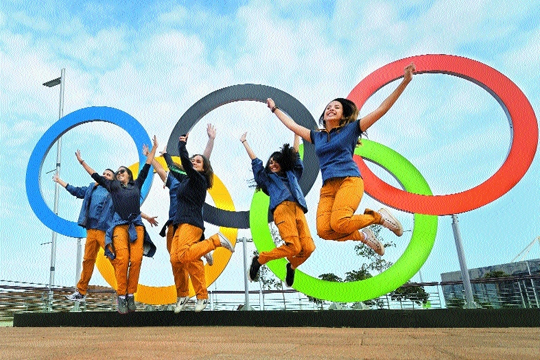Rio de Janeiro, Aug 5: The most crisis-ridden Olympic Games in history opens on Friday with Rio organisers hoping to draw a line under a turbulent seven-year build-up to the greatest sporting show on Earth.
Football legend Pele is tipped to ignite the Olympic flame at Rio's iconic Maracana Stadium in Friday's opening ceremony, as the four-yearly celebration of sporting endeavour arrives in South America for the first time.
Olympic chiefs will hope the ceremony marks the start of a 17-day carnival of sport, a feast of drama framed by a Rio backdrop of breathtaking natural beauty.
Jamaican sprint king Usain Bolt will compete under the gaze of the Christ the Redeemer statue, sailors will duel in the shadow of Sugarloaf Mountain while the golden sands of Copacabana will host the spiritual homecoming of the beach volleyball tournament.
Yet the sporting spectacle comes after a frequently chaotic build-up which at times has threatened to leave the city nursing a nasty hangover before the party even starts.
When Rio successfully won the race for the Games in 2009, the 2016 Olympics looked set to be the crowning glory of a dynamic, newly-confident Brazil.
But a brutal recession, double-digit unemployment, fears about the mosquito-borne Zika virus, embarrassing infrastructure stumbles and a political crisis that led to the impeachment of President Dilma Rousseff have all but extinguished the euphoria that greeted the vote victory.
More than one million tickets, or 20 percent of the total, including for coveted events such as the men's 100-metres final, remained unsold as of Wednesday.
'The country is very sad'
"In a way the Olympics is good for Brazil to help us develop, but the country is very sad, full of violence and unemployment," Carlos Roberto, 56, a dockyard worker said.
"You go into a hospital and can't find a doctor or medicines."
"It will bring some happiness, yes it will," added pharmacist Edna Carla Assis, 31. "But nothing more."
Several ambitious plans to transform Rio have long since been abandoned, including a pledge to clean up the city's filthy Guanabara Bay.
That failure means athletes in Olympic sailing and windsurfing events will be forced to compete in a toxic soup of raw sewage from half of the city's population.
The Zika virus -- which can cause serious birth defects if pregnant mothers are infected -- has prompted all of the world's top four golfers to withdraw from the games.
Brazilian officials insist that the threat of infection is near zero in what is one of the coolest times of the year.
A vast security blanket of 85,000 military personnel and police -- twice the number on duty at the 2012 London Games -- will be draped over the city to ward off the threat of terror attacks.
Not even the beefed-up security, however, is likely to offer total protection against Rio's long-running problems with high crime.
Danish, Chinese and Australian delegations have already reported thefts from team members since arriving in Brazil, while in May members of Spain's sailing team were mugged at gunpoint.
While Rio has had its hands full scrambling to manage the grim litany of problems, the Olympic movement has been battling to cope with the Russian doping scandal.
A devastating report by a World Anti-Doping Agency (WADA) investigative panel issued last November detailed a state-supporting doping program that harked back to the worst steroid scandals of the Cold War-era.
The International Association of Athletics Federations (IAAF) subsequently banned Russian track and field athletes from all international competition for six months.
The IAAF later extended that suspension to cover the Olympics after ruling that Russia had not taken sufficient steps to overhaul its anti-doping regime.
More damning revelations erupted last month with the release of a WADA report by Canadian lawyer Richard McLaren which documented the full scale of Russian cheating, including an elaborate scheme to cover-up positive drug tests at the 2014 Winter Olympics and 2013 World Athletics Championships.
Bolt, Phelps return
The fallout from the drugs scandal should give way to several compelling sporting storylines once the action gets under way.
Once again, Jamaican superstar Bolt could electrify his sport when he attempts to defend his 100m, 200m and 4x100m relay crowns in the blue riband track and field event.
All eyes will turn to the Olympic swimming pool in the opening week when US star Michael Phelps returns for his swansong.
The most decorated Olympian in history -- 22 medals, 18 golds -- has returned from retirement for one last crack at glory at the age of 31.
Gymnastics meanwhile could see the coronation of a new darling with America's teenage star Simone Biles while football superstar Neymar bids to inspire Brazil to a first ever Olympic gold medal.
New sports making their debut in Rio will include seven-a-side rugby and golf.
As always, however, while millionaire globally renowned stars like Bolt, Phelps and Neymar chase gold, it is the lesser known athletes who will relish their moment in the spotlight.
The 10 athletes who comprise the first ever Olympic Refugee team are among the hundreds of inspiring human stories to be found in Rio.
They include Yusra Mardini, an 18-year-old from Syria who less than a year ago was forced to swim for her life during a perilous journey across the Mediterranean as she fled her war-torn homeland.
Another refugee athlete, judoka Yolande Mabika, said simply: "This is not just a struggle for sport -- it's a struggle for life."





Comments
Add new comment